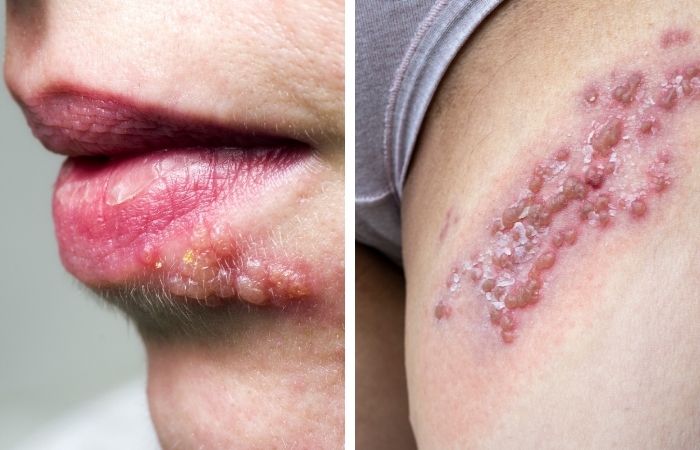For something that affects hundreds of millions of people worldwide, herpes is still wildly misunderstood. One of the most confusing, and most important, questions people ask is this: “What’s the difference between oral and genital herpes?” The answer isn’t just academic. It affects who you tell, how you treat it, and how you protect yourself and your partners.
Let’s break it down in a way that’s clear, grounded in science, and stripped of shame.
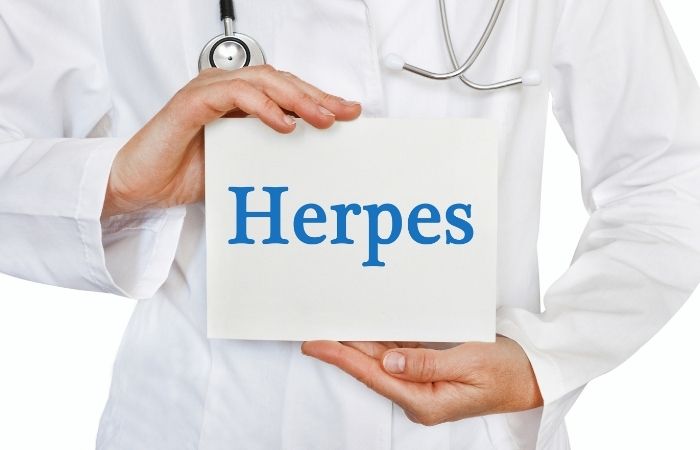
People are also looking for: Home Herpes Test Kit: How to Test for Herpes Safely and Privately
Understanding the Two Types: HSV-1 and HSV-2
Herpes is caused by the Herpes Simplex Virus. There are two main types that matter here:
- HSV-1 (Herpes Simplex Virus Type 1): Most often causes cold sores around the mouth and lips.
- HSV-2 (Herpes Simplex Virus Type 2): Primarily causes genital herpes.
But the truth is, both types can infect both the mouth and the genitals. That’s where the confusion, and the stigma, really starts to snowball.
Oral Herpes: What It Looks Like and How It Spreads
Oral herpes is commonly caused by HSV-1. It often shows up as cold sores or fever blisters near the lips, but it can also appear inside the mouth or on the chin, cheeks, or nose.
Transmission: Usually spreads through kissing, sharing utensils, or oral sex.
Key facts:
- Cold sores = herpes. Many people don’t realize their “cold sore” is an STI virus.
- Most people get HSV-1 in childhood through nonsexual contact like family kisses or shared drinks.
- You can pass HSV-1 from your mouth to someone’s genitals through oral sex, even if you don’t have visible sores.
According to the World Health Organization, over 3.7 billion people under age 50 are infected with HSV-1 worldwide.
Check Your STD Status in Minutes
Test at Home with RemediumGenital & Oral Herpes Test Kit
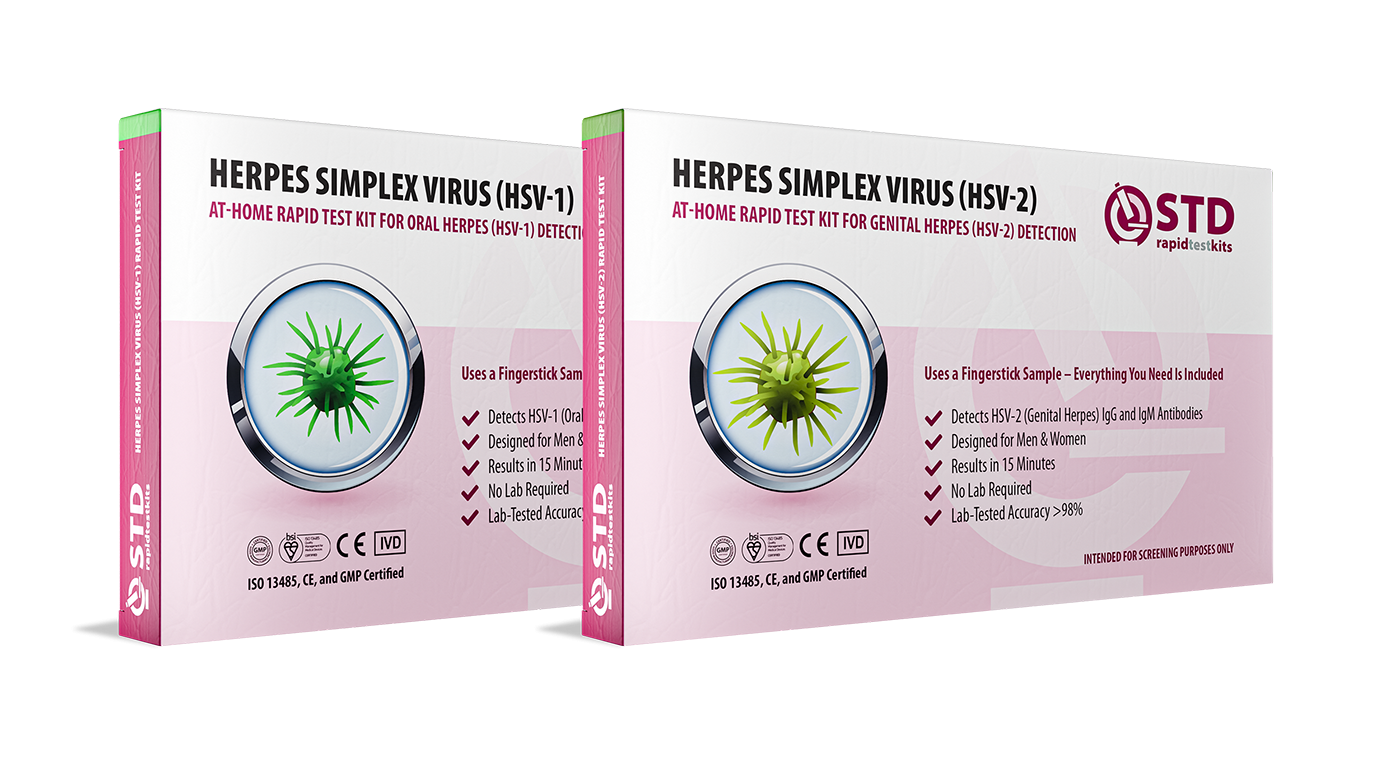
 For Men & Women
For Men & Women Results in Minutes
Results in Minutes No Lab Needed
No Lab Needed Private & Discreet
Private & DiscreetOrder Now $75.00 $98.00
For all 2 tests
Genital Herpes: Symptoms, Transmission, and What to Know
Genital herpes is most often caused by HSV-2, though HSV-1 is now responsible for an increasing number of genital cases, especially in younger adults and people who engage in oral sex.
Symptoms of genital herpes:
- Blisters or sores on or around the genitals, anus, or thighs
- Itching, burning, or tingling before an outbreak
- Pain while urinating (especially in people with vaginas)
- Flu-like symptoms during initial outbreak: fever, swollen glands, fatigue
Not everyone has obvious symptoms, and some have none at all. That’s why herpes is so often transmitted unknowingly.
HSV-1 vs HSV-2: Key Differences That Actually Matter
Here’s what really separates these two viruses, and what doesn’t:
| Category | HSV-1 | HSV-2 |
|---|---|---|
| Common Location | Mouth (oral herpes) | Genitals (genital herpes) |
| Transmission | Kissing, oral sex, sharing items | Genital contact, vaginal/anal sex |
| Can infect both areas? | Yes | Yes |
| Outbreak Frequency | Less frequent (if genital) | More frequent and severe |
| Global Prevalence | 67% of world population under 50 | 11% of people aged 15–49 |
So yes, while HSV-1 is usually “oral” and HSV-2 is usually “genital,” the location isn’t guaranteed. And both are contagious through skin-to-skin contact, even if you’re symptom-free.
Cold Sore ≠ Harmless: Why Oral Herpes Still Counts
There’s a weird double standard: Cold sores are seen as no big deal, but genital herpes still carries shame. That makes no sense medically, or ethically.
- Same virus family. Cold sores are caused by herpes. That’s it. Period.
- Same risk of transmission. Oral herpes can spread to the genitals during oral sex.
- Same lifelong presence. Once infected, both viruses stay in your nervous system permanently.
“My boyfriend gave me genital herpes with a kiss,” said one 23-year-old in a SELF interview. “I had no idea cold sores could do that.” You’re not alone if you didn’t either.
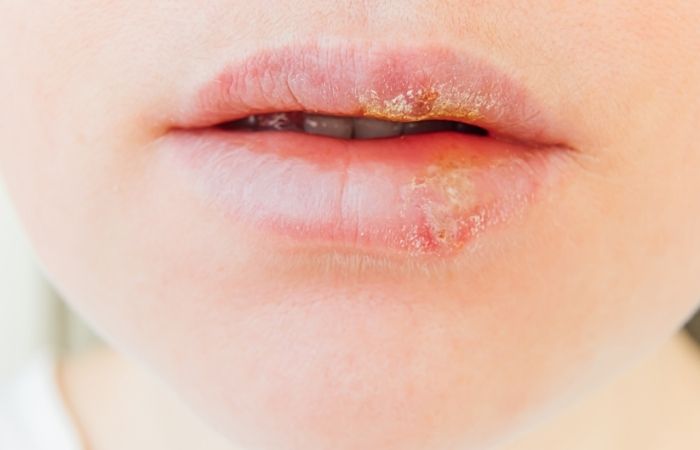
People are also reading: She Gave Me Her Heart… and Herpes
Can You Have Both Types at Once?
Yes. You can have HSV-1 orally and HSV-2 genitally, or the reverse. You can also have HSV-1 in both places or HSV-2 in both places. It depends on exposure, timing, and immune response.
Here’s what we know:
- HSV-1 genital infections tend to have fewer outbreaks than HSV-2.
- Having one type offers partial protection against acquiring the other, but not full immunity.
- You can test positive for both types without ever remembering a single sore.
If this sounds overwhelming, you’re not alone. That’s why at-home herpes testing is so important, especially if you’ve had unprotected sex or multiple partners.
Testing for HSV-1 and HSV-2: What You Need to Know
Most routine STD panels do not test for herpes unless you ask. That’s a huge oversight, especially when oral herpes is often left off the radar entirely.
Types of herpes tests:
- Blood test (IgG type-specific): Tells you if you have HSV-1, HSV-2, or both
- Swab test: Used during an active outbreak to identify which type is present
At-home test kits like the Genital Herpes-2 At-Home Rapid Test Kit or Oral Herpes-1 At-Home Rapid Test Kit make it easier than ever to know your status, no awkward clinic visits required.
Check Your STD Status in Minutes
Test at Home with Remedium6-in-1 STD Rapid Test Kit

 For Men & Women
For Men & Women Results in Minutes
Results in Minutes No Lab Needed
No Lab Needed Private & Discreet
Private & DiscreetOrder Now $119.00 $294.00
For all 6 tests
Stigma Check: Why Oral vs. Genital Language Hurts
Let’s be honest: When people say “cold sore,” it sounds manageable. When they say “genital herpes,” it sounds scary. But medically, they’re both herpes, and both deserve the same compassion and clarity.
Stigma leads to silence. Silence leads to misinformation. Misinformation leads to transmission. That’s the cycle we’re here to break.
- Oral herpes = common but overlooked
- Genital herpes = stigmatized but equally common
- Both = manageable with the right tools and knowledge
Whether it’s on your mouth or your genitals, herpes doesn’t define your worth, your cleanliness, or your right to love and be loved.
Treatment: Does It Change Based on Location?
Surprisingly, not much. Both oral and genital herpes are treated with antiviral medications like:
- Acyclovir
- Valacyclovir (Valtrex)
- Famciclovir
You can take them:
- Episodically: When you feel an outbreak coming on
- Daily (Suppressive Therapy): To reduce outbreaks and lower transmission risk
Your doctor may recommend suppressive therapy if you have frequent outbreaks or if you want to reduce the risk of passing the virus to a partner, especially if they’re uninfected.
Protecting Your Partners: Real Talk About Prevention
Here’s how to lower the risk of spreading herpes, no matter where it shows up:
- Use condoms or dental dams for all forms of sex
- Avoid kissing or oral sex during active cold sores
- Don’t share utensils, razors, or lip balm if you have oral herpes
- Consider suppressive antiviral meds if you’re sexually active
- Tell your partner, with confidence, not shame
Honesty is sexy. Safety is sexy. Shame isn’t.
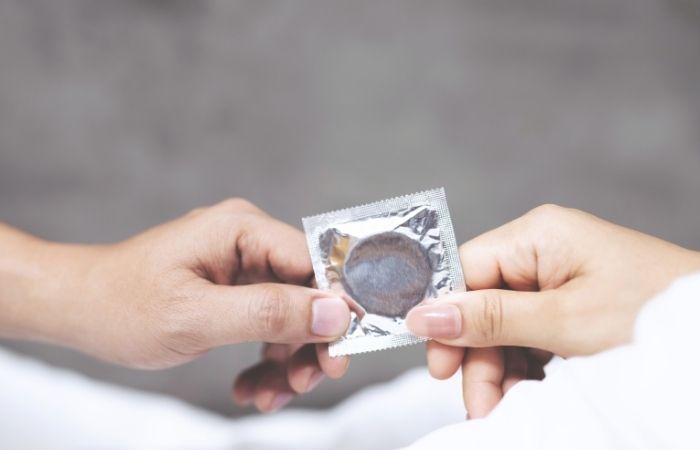
People are also looking for: Tuskegee’s Long Shadow: How Mistrust Fuels Today’s STD Crisis
FAQs
1. Is HSV-1 always oral and HSV-2 always genital?
No. HSV-1 usually affects the mouth, and HSV-2 usually affects the genitals, but either virus can infect either area.
2. Can I get genital herpes from oral sex?
Yes. If someone has oral HSV-1, they can pass it to your genitals through oral sex, even if they don’t have a visible cold sore.
3. Do both types of herpes stay in your body forever?
Yes. Both HSV-1 and HSV-2 remain in your nerve cells for life, though they may stay dormant for long periods.
4. Is oral herpes considered an STI?
Technically, yes. Herpes is transmitted through intimate contact, including kissing and oral sex. But it’s so common, many don’t think of it that way.
5. Can I have both types of herpes?
Yes. You can have HSV-1 and HSV-2 at the same time, in the same or different locations.
6. Are cold sores always herpes?
Nearly always, yes. Cold sores are usually caused by HSV-1. Many people don’t realize it’s a form of herpes.
7. Can HSV-2 affect the mouth?
It’s rare but possible. HSV-2 oral infections are less common but can happen with oral-genital contact.
8. Can you have herpes and never know it?
Absolutely. Many people never notice symptoms or mistake them for something else.
9. How can I find out what type I have?
A type-specific blood test (IgG) can tell you if you have HSV-1, HSV-2, or both, even if you have no symptoms.
10. Does it matter which type I have?
Yes, for predicting outbreak frequency and understanding transmission risk. But both deserve equal respect and care.
Know The Difference
Oral herpes isn’t “less dirty.” Genital herpes isn’t “more shameful.” They’re both just viruses, common, persistent, annoying, and manageable. Whether you’ve got a cold sore or a genital outbreak, you deserve clarity, care, and compassion.
Testing doesn’t just help you, it helps your partners, your mental health, and your peace of mind. Herpes doesn’t define your body, your sex life, or your future. But knowing what you have? That’s real power.
Sources
1. CDC: Genital Herpes – Fact Sheet
2. Mayo Clinic: Herpes Simplex
3. NHS: Genital Herpes Overview






